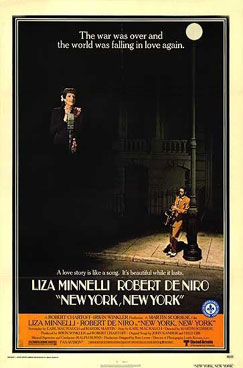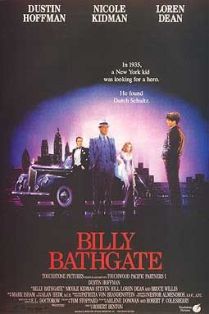
Welcome to the next CHUD List.
We’ve
tackled our essentials list and the continued revelation of our Kills
List from 2003, and now that we’ve begun the beguine, we must continue.
Behold:
The CHUD.com Top 50 Disappointments.
A
quick word on the criteria. We could very easily have spent this whole
article discussing sequels and prequels and adaptations of television
shows and called it a day. Instead, we tried to go a different route.
Also, from a master list of over 100, the involved parties (Devin,
Jeremy, Micah, Russ, and myself) all killed off a choice for each one
we claimed. As a result, we’ll run a big list at the end of this of the
‘ones that got away’. So, here is day one of many where we chronicle
the 50 Biggest Disappointments. Two a day, every week day for five
weeks. In no particular order: #48 – New York, New York (1977. dir. Martin Scorsese)
#48 – New York, New York (1977. dir. Martin Scorsese)
Disappointments need to be taken in context. And the context for New York, New York is that Martin Scorsese had just come off of one of the great young director streaks of all time: Mean Streets blew the lid off him, while Alice Doesn’t Live Here Anymore showed that he had remarkable range. And of course Taxi Driver heralded his ascension into the ranks of The Greats with a movie that’s not just an artistic achievement but that also hit the culture like a bullet to the brain. So when Scorsese reteamed with his cinematic soulmate, Robert DeNiro, and tackled classic Hollywood musicals – with Judy Garland’s daughter in the mix – expectations were high. And they were all dashed.
New York, New York fails on almost every possible level – it’s ugly and squalid, feeling more like a brutal deconstruction of musicals than a modern take on them, which was Scorsese’s avowed intention. DeNiro’s character is a petty, abusive jerk and the whole story just meanders around for almost three hours. The movie, which balances between period realism (it’s set post-WWII) and faux-soundstage hyper-reality, is just plain crummy looking. As a whole, the movie is remarkably unpleasant.
The one thing New York, New York has going in its favor is the title song, which became ultra famous after Frank Sinatra sang it at a Radio City Musical Hall concert in 1979. The film ended up being a flop, and Scorsese, who had already been descending into a coke-fueled hell, spiraled further downward, eventually landing in the hospital, where DeNiro brought him the autobiography of Jake LaMotta… – Devin
Travesty Scale (1-10): 7 out of 10
 #47 – Billy Bathgate (1991. dir. Robert Benton)
#47 – Billy Bathgate (1991. dir. Robert Benton)
E.L. Doctorow’s lovely 1989 novel about a "capable" boy’s gradual induction into the seductive gangster lifestyle was entrusted in 1990 to a capable director (Robert Benton), a sensationally capable actor (Dustin Hoffman) and perhaps the most capable of screenwriters, Tom Stoppard. The tale of a young man’s journey from juggling street urchin to trusted associate of feared mobster Dutch Schultz is a magical one; Doctorow’s non-linear narrative is so deftly constructed and vividly conveyed that one sees the whole thing unfold as if a film.
As is very often the case, what’s cinematic on the page tends to be sluggishly schematic on screen – and that’s why you bring in a genius like Stoppard, who’d just performed a miracle with his note-perfect adaptation of another fiercely literary bildungsroman, J.G. Ballard’s Empire of the Sun. Hiring Stoppard seemed an egoless acknowledgment by director Benton – a two-time Academy Award-winning screenwriter – that someone with a more fertile imagination than his would be required to do Doctorow’s tome justice.
The problem, though, is that, in the minds of anyone who loved the book, "justice" meant an instant American classic, which put the filmmakers squarely behind the eight ball (hugging the rail, teetering over the corner pocket) before a foot of film had been shot. Then came the production delays, rumors of friction between Hoffman and Benton, a missed summer release date and reshoots; suddenly, the movie everyone wanted to see became the disaster from which no one could look away. By the time Touchstone Pictures meekly slid Billy Bathgate into theaters on November 1, 1991, critics were more interested in reviewing the production difficulties than they were the finished film.
Unfortunately, aside from a terrific supporting turn from Steven Hill as Billy’s mentor, Otto Berman (someone, either Stoppard or Benton, inexplicably dropped the character’s endearing, real-life nickname, "Abbadabba"), the critics were justified in dwelling on the behind-the-scenes strife. Even with the artful contributions of the late cinematographer Nestor Almendros (this was his last film) and production designer Patrizia von Brandenstein, Benton’s Billy Bathgate was/remains a singularly listless affair. It’s difficult to pinpoint where Benton and Stoppard went wrong, but the film’s stultifyingly prosaic approach reflects a lack of affection toward the material; it’s a crass cut-and-paste job. There’s also the problem of Loren Dean, a fine actor who must’ve been directed to play the title character as a blank slate. Whereas Dean is merely bland, Nicole Kidman is downright awful as Dutch’s moll with whom Billy falls hopelessly in love. And, yet, the film’s enduring legacy is her bluntly shot full-frontal nude scene – a fitting metaphor for the clumsy profaning of an American classic. – Jeremy
Travesty Scale (1-10): 8 out of 10
Previously Disappointing:
The Ladykillers
Once Upon a Time in Mexico